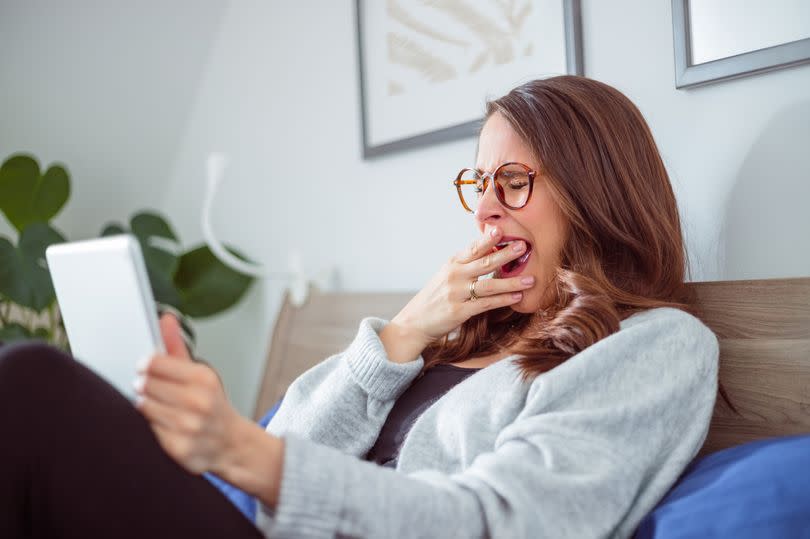Experts explain three reasons why you might always be feeling tired

Feeling tired all the time can really mess up your day.
No matter how much sleep you get, or how many cups of coffee you drank, if you feel like you're always dragging yourself around, then there could be other factors at play.
These are three overlooked causes identified by experts that could be making you feel groggy. And you might find them quite surprising.
1. Caffeine
For many people, the day doesn't start without the coffee pot brewing. However, a functional nutritionist, known as 'Kellie', warned guzzling too much caffeine could actually be causing fatigue.
She provided some expert insight on her TikTok account @healthandkellness_, saying: "Reasons that you're chronically tired every single day... You are slugging back caffeine in the morning and throughout the day which is only contributing to high cortisone levels and blood sugar dysregulation."
Caffeine, found in drinks such as coffee, tea, fizzy pop and even hot chocolate, disrupts our regular sleep-wake cycles. It interferes with adenosine receptors - these are crucial to helping us feel sleepy.
Nutritionist Helen Bell from UK Care Guide also stressed: "Caffeine is a double-edged sword. It can provide a quick boost of energy by stimulating the central nervous system, but in my experience, over reliance on caffeine can lead to energy crashes and disrupted sleep patterns."
2. Food
Helen, a nutrition expert, has highlighted the importance of consuming the 'right' foods to maintain energy levels throughout the day. She pointed out that simple sugars and refined carbohydrates, often found in sweets, pastries, white bread and sugary cereals, can lead to energy dips due to rapid spikes and drops in blood sugar levels.
She also warned against foods high in unhealthy fats, such as fried foods and fast food, which can cause sluggishness due to their longer digestion time and diversion of energy from other bodily functions.
Instead, Helen advises her clients to opt for lean proteins, healthy fats and complex carbohydrates. These foods, unlike simple carbs, take longer for our bodies to digest, resulting in a more stable release of energy.
She emphasised: "I always recommend incorporating complex carbohydrates, lean proteins, and healthy fats into their diets. Foods such as oatmeal, whole grains, nuts, seeds, and legumes release energy slowly, helping to maintain stable blood sugar levels.
"Also, foods rich in vitamins and minerals, such as leafy greens, berries, and citrus fruits, can help boost energy levels due to their high antioxidant content. I also advocate, as you'd expect, for regular, balanced meals and snacks to keep your energy levels stable and avoid long gaps without food."
3. Movement
Lastly, 'Kellie' suggests getting outside every day and limiting screen time where possible. On TikTok, she explained: "Perhaps you are sitting on calls all day on your laptop or on your phone and you are not getting any daily movement or sunshine, which is contributing to fatigue.
"So, get some sleep, stop drinking so much coffee, get outside every single day and make sure you're eating enough food."
Interestingly, recent research by the University of Texas St Austin revealed that exercise can aid us in achieving a deeper 'NREM' sleep before our brains reach the 'REM stage'.
While this might sound complex, NREM and REM are just two of the five stages we experience when we go to bed.
NREM typically occurs in the first half of the night and simply refers to the point at which our bodies truly relax and repair. REM, however, is when our brains become somewhat more active.
This is the stage where dreaming is most likely to happen - including lucid dreams - where you have some level of control over the 'plot' of your dream.
The authors of the Nature study highlighted the benefits of physical activity on emotional wellbeing, stating: "Regular physical activity has been associated with greater emotional wellbeing, and even just one bout of physical activity can elevate mood." They also noted the negative impact of poor sleep, adding: "On the other hand, poor sleep is associated with mood disorders and affective dysregulation, and sleep disturbances are often comorbid with anxiety and depression."
Rosey Davidson, a top sleep consultant at Just Chill Baby Sleep, further explained to The Mirror the importance of exercise for sleep quality: "Exercise plays a key role in promoting better sleep, through its positive impact on both physical and mental health."
She elaborated on how regular physical activity aids in regulating the body's internal clock and improving the sleep-wake cycle, saying: "Engaging in regular physical activity helps regulate the body's internal clock - circadian rhythm - which governs the sleep-wake cycle. Exercise can reduce cortisol (our stress hormone) and release of endorphins, which are natural mood lifters. Both of these things will contribute to a better night's sleep."

 Yahoo News
Yahoo News 
